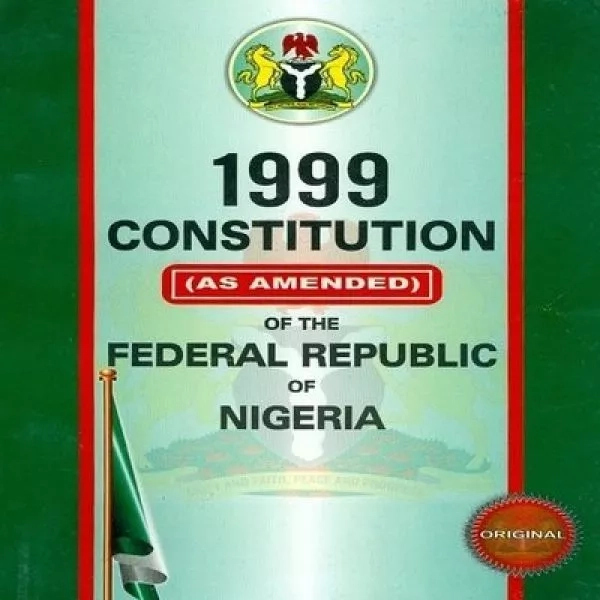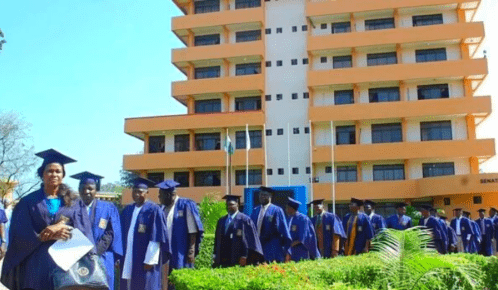The 1999 Constitution of the Federal Republic of Nigeria(as amended) is the foundation of all laws and governance in the Federal Republic of Nigeria. All other laws, institutions and actions or any body or persons derive their validity from the Constitution.
The position of the Constitution in the Nigerian legal system is that of supremacy. Section 1(1) of the 1999 Constitution provides that ‘This Constitution is supreme and its provisions shall have binding force on the authorities and persons throughout the Federal Republic of Nigeria.’
Section 1(3) further provides that ‘ If any other law is inconsistent with the provisions of this Constitution, this Constitution shall prevail, and that other law shall, to the extent of the inconsistency, be void.’
The process of amendment or alteration of any provision of the 1999 Constitution is contained in Section 9 of the same Constitution.
Read Also: 10 Problems of Nigerian Legal System and Possible Solutions

An amendment of the constitution is the change or alteration of the words of the constitution, the amendments may be due to defects or to accommodate recent realities.
The process of the amendment is similar to the general process of law making or amendment, however due to the position of the Constitution, the process is more stringent and cumbersome.
The power to amend any provision of the 1999 constitution is vested in the National Assembly, that is to say the Senate and the House of Representatives. ( Section 9(1) of the 1999 Constitution of the Federal Republic of Nigeria.)
The process other amendment can be broadly categorized into two;
Read Also: 6 Functions of the Nigerian Senate
1. Provisions for which four-fifths majority is required
Generally, for any passage of law or amendment, the required majority is usually two-third. However for the purpose of constitutional amendment on some matters, four-fifth of majority is required. This requirement is stated in section 9(3) of the 1999 Constitution. This sub-sextion provides that;
“An Act of the National Assembly for the purpose of altering the provisions of this section, section 8 or Chapter IV of this Constitution shall not be passed by either House of the National Assembly unless the proposal is approved by the votes of not less than four-fifths majority of all the members of each House, and also by resolution of the House of Assembly of not less than two-third of all States.”
From the provisions of the above sub-section, matters in which four-fifth majority include;
a. Section 8 of the 1999 Constitution
Secuon 8 of the Constitution contains the process for the creation of a new state in Nigeria, boundary adjustment of an existing state and the creation of a new local government area. (Section 8(1), (2) and (3) of the 1999 Constitution respectively.)
b. Chapter IV of the 1999 Constitution
Chapter IV of the 1999 Constitution contains fundamental human rights. To ensure that the sanctity of these rights are protected, any amendments that is to be made I’m respect of this chapter are brought within the confines of four-fifth majority requirement of the National Assembly.
c. Section 9 of the 1999 Constitution
The process of amendment of the 1999 Constitution contained in section 9 is also subject to the four-fifth majority requirement.
This is to prevent any arbitrary or superfluous amendment of the Constitution. This is will preserve the position of the Constitution as the supreme law of the nation.
It should also be noted that aside the approval of the proposal for amendment by the four-fifth majority of each house of the National Assembly, a resolution of the House of Assembly of not less than two-third of all States is also required.
There are 36 states in the Federal Republic of Nigeria, therefore such approval must be made by House of Assembly of 24 states.
Read Also: The Role of Government in the Nigerian Environment
2. Provisions for which two-third majority is required
This requirement is contained in section9(3) of the Constitution. This section provides that;
‘An Act of the National Assembly for the altertion of this Constitution, not being an Act to which section 8 of this Constitution applies, shall not be passed in either House of the National Assembly unless the proposal is supported by the votes of not less than two-thirds majority of all the members of that House and approved by resolution of the Houses of Assembly of not less than two-thirds of all the States.’
This is to say that all other matters of the constitution in exclusion to those mentioned above will be passed by two third majority of all the members of the National Assembly.
It has already been said that the process of amendment is similar to the process of law making, a proposal for amendment can be made by the executive or member of the legislature.
The proposal or bill passes through the 1st reading stage, second reading, public hearing and third reading where the bill will be passed.
After the bill is successfully passed by the National Assembly, it is sent to be passed by the States Houses of Assembly. The Act of the National Assembly is then to be passed in at least 24 states.
It should be noted among other things that for the purpose of section 8, which relates to local government or boundary adjustment, special procedures are to be followed before the act is sent to the National Assembly to be passsed.
There are several opinions and counter opinions about whether the assent of the president is required for an amendment passed by the National Assembly, some scholars have argued that the proposal for amendment passed by National Assembly requires the assent of the president, as it is required for the passage of ordinary laws.
Read Also: Functions of Nigerian National Assembly
A careful examination of section 9 of the Constitution which sets out the procedure for the amendment of the reveals that there’s no requirement for a presidential assent, therefore there is no need to apply the provisions of section 58 of the Constitution which requires the assent of the president for a bill.
The Constitution occupies an important position in our legal order, therefore it should be preserved with dignity. Amendment is expedient in some circumstances, the procedure for amendment is thus stringent and cumbersome.





